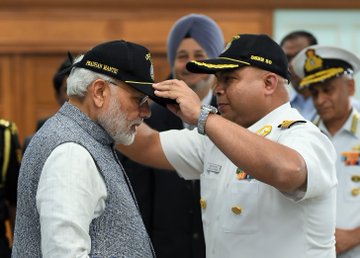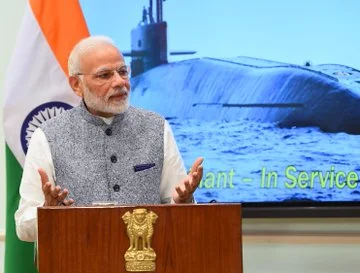NEW DELHI. India achieved a remarkable feat recently when Strategic Strike Nuclear Submarine (SSBN) INS Arihant returned from its first deterrence patrol completing the establishment of the country’s survivable nuclear triad.
The journey took another milestone today on November 5 when Prime Minister Narendra Modi received and felicitated the crew of SSBN INS Arihant.
Stressing the significance of the successful deployment of INS Arihant for the completion of India’s nuclear triad, Prime Minister Modi congratulated the crew and all involved in the achievement which puts India among a handful of countries having the capability to design, construct and operate SSBNs.
Noting that the indigenous development of the SSBN and its operationalisation attest to the country’s technological prowess and the synergy and coordination among all concerned, he thanked them for their dedication and commitment in realising this pioneering accomplishment enhancing immensely the country’s security.

The Prime Minister commended the courage and commitment of India’s brave soldiers and the talent and perseverance of its scientists, whose untiring efforts transformed the scientific achievement of nuclear tests into establishment of an immensely complex and credible nuclear triad, and dispelled all doubts and questions about India’s capability and resolve in this regard.
PM Modi stated that the people of India aspire for a ‘Shaktimaan Bharat’ (Strong India) and building a New India. They have strived tirelessly to overcome all challenges in this path. He stressed that a strong India will fulfill the hopes and aspirations of over a billion Indians and will also be an important pillar for global peace and stability, especially in a world full of uncertainties and concerns.
The Prime Minister extended greetings to the participants and their families on the occasion of Deepawali, the Festival of Light and expressed hope that just as light dispels darkness and all fear, INS Arihant will be harbinger of fearlessness for the country.
As a responsible nation, India has put in place a robust nuclear command and control structure, effective safety assurance architecture and strict political control, under its Nuclear Command Authority. It remains committed to the doctrine of Credible Minimum Deterrence and No First Use, as enshrined in the decision taken by the Cabinet Committee on Security (CCS) in its meeting chaired by the then Prime Minister Atal Bihari Vajpayee on January 4, 2003.





